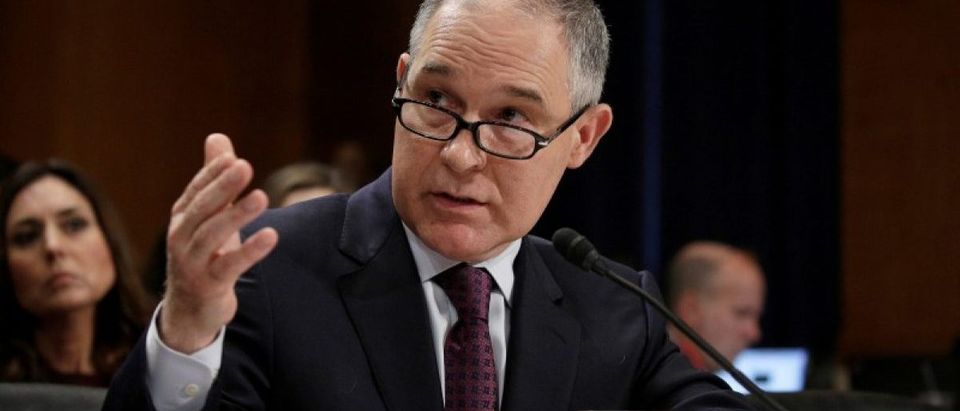EPA Administrator Scott Pruitt generated considerable heat from Democrats for saying man-made carbon dioxide is not the ‘primary contributor’ to global warming, just I did under the Clinton Administration.
As a senior-level Research Microbiologist in EPA’s Office of Research & Development, I conducted my own climate change research while overseeing a global warming project headed by President Clinton’s Associate Director for the White House Office of Science & Technology Policy.
In 1999, I published a paper in Nature indicating certain EPA policies could actually exacerbate some of the adverse health effects of climate change.
ORD Assistant Administrator Norine Noonan ordered that my laboratory director be removed; and I agreed to be temporarily transferred to the University of Georgia’s Department of Marine Sciences.
When my appointment at UGA ended, EPA waived government regulations requiring that I work an equal number of years at ORD, and terminated my employment. Thus ended my 32 years as an EPA scientist.
Like me, other scientists at EPA and elsewhere were concerned about how federal agencies under the leadership of Vice President Al Gore were laying a foundation to argue man-made CO2 drives global warming. It’s important to understand that the science underlying this consensus is largely grounded in suppressing any research suggesting that man-made CO2 is not the primary contributor.
Individual scientists who discard unwanted results and only publish data supporting their conclusions are guilty of research misconduct. If caught, their work is retracted and their careers are ended. This same standard, however, is never applied to federal agencies that selectively fund scientists who support their policies, and silence their own researchers who don’t toe the line.
Such misconduct casts doubt on all of the scientist’s work. Hence, scientists caught selectively publishing data must withdraw their whole study, and not just a particular table or graph where they omitted unwanted, but valid, data.
The same should be true of EPA’s whole body of scientific literature created to support its policy on global warming by funding like-minded scientists and repressing unsupportive data. Yet President Obama and Secretary of State John Kerry took exactly the opposite approach—saying scientists who question this position should be charged with malpractice.
Recently, I was invited to address the issue of growing public skepticism over the scientific literature at a meeting of the Royal Society of London. There, I talked about how prevalent data fabrication at EPA and other federal agencies has become. Marc Edwards at Virginia Tech, for example, has testified to Congress about data fabrication by EPA and the CDC to cover up high levels of lead in drinking water in Washington DC and Flint Michigan.
Similarly, in one case where I served as an expert witness in my private capacity, a federal judge in Georgia ruled that 20 years of environmental data EPA published were fabricated to support an EPA policy. During depositions, scientists who authored the study admitted under oath that they knew the data were unreliable.
Yet, even in such a heinous case of research misconduct as this, EPA refuses to withdraw its scientific article containing the fabricated data. Supporting its policies is more important to EPA than scientific integrity.
More recently, a NOAA scientist reported to me that his agency is fabricating global warming data gathered in the Atlantic Ocean. He said: “I see the data it collects, and what’s being sent to Washington. And they’re not the same.”
At EPA, I had the same reservations as Administrator Pruitt about man-made CO2 being the primary contributor to global warming. Most scientists agree that, when global warming occurs, oceans begin to heat up before the atmosphere warms.
That being the case, how can it even be possible that man-made CO2 in the atmosphere is driving global warming? Just warming the oceans in and of itself could produce far more natural CO2 than comes from human activity.
David Lewis, Ph. D., is a scientist who worked for EPA and is now research director for the Focus for Health Foundation in Watchung, NJ.


